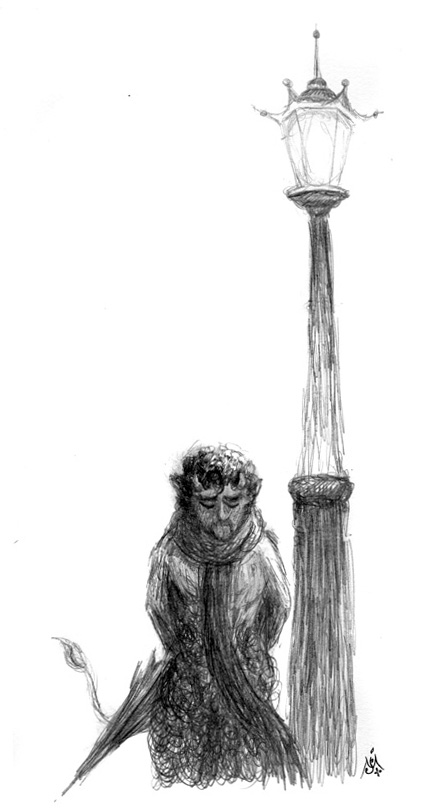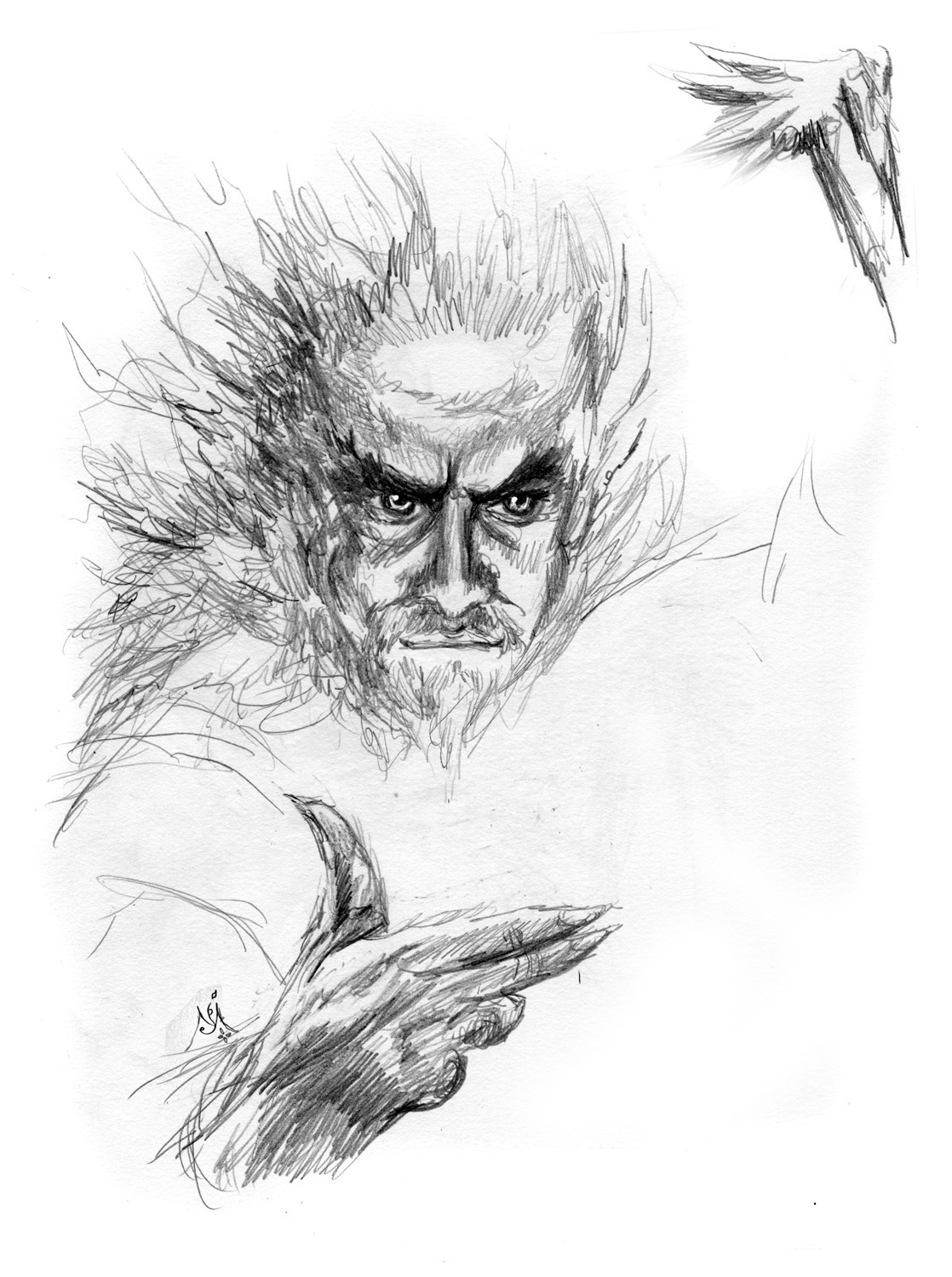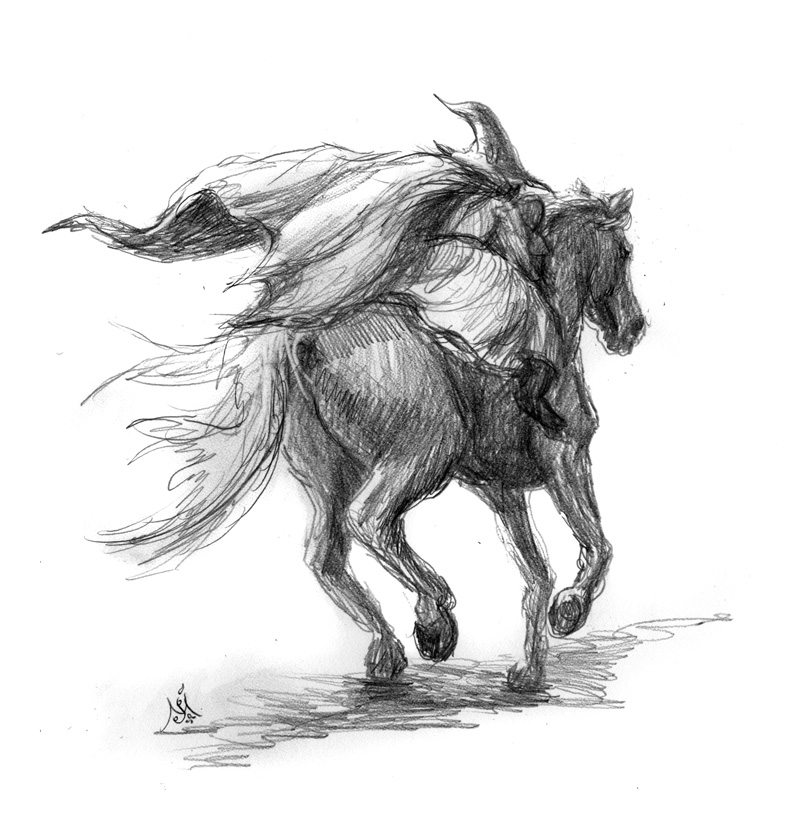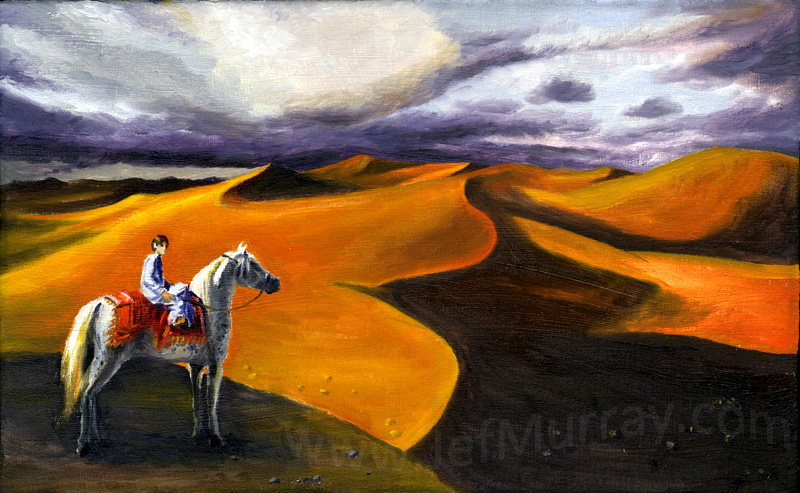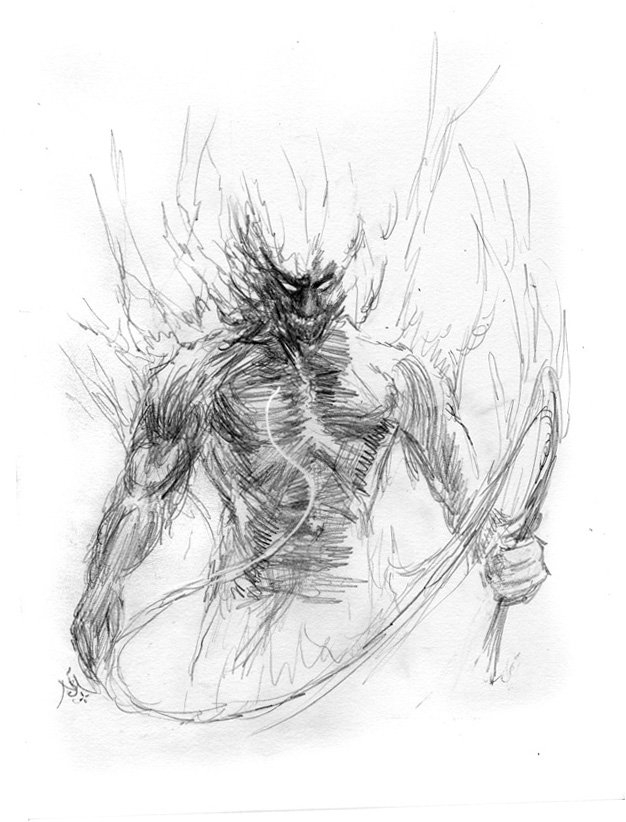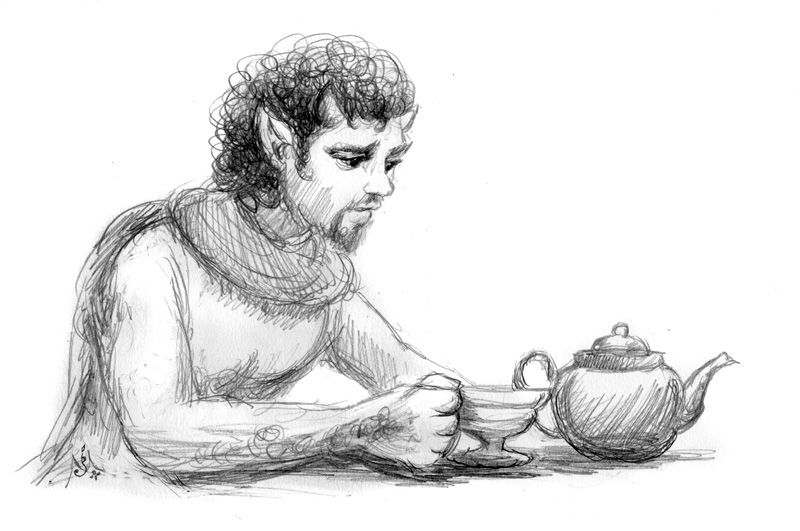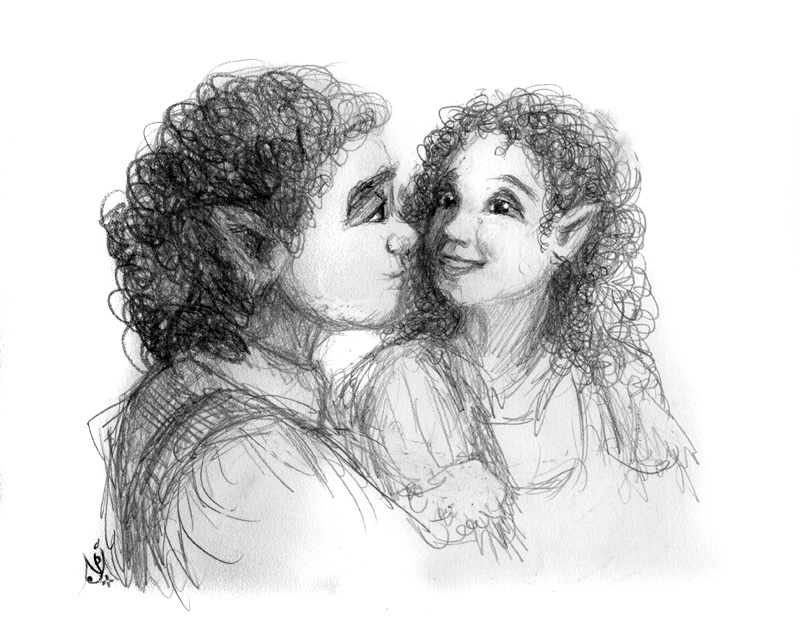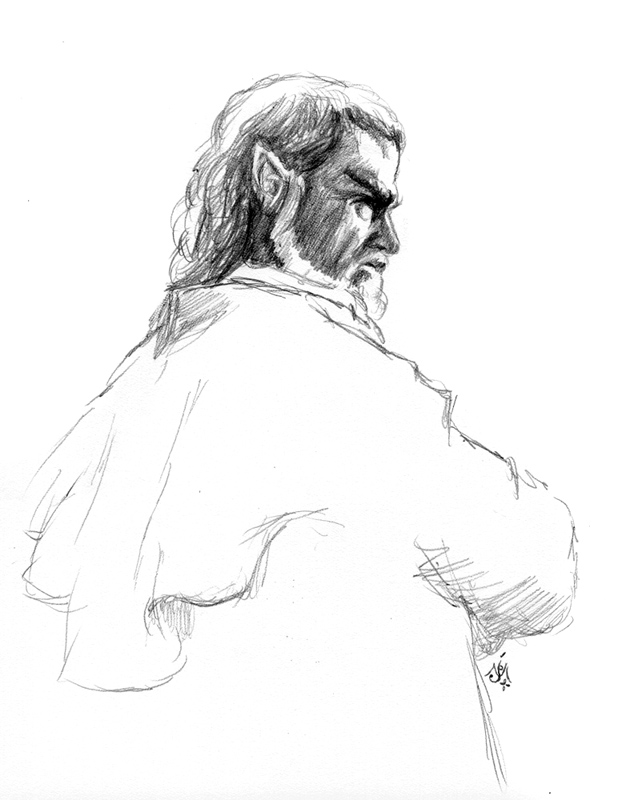Monthly Archives: May 2013
Melkor
“Into the West” blog interview
Here are parts I and II of my interview with Philip Kosloski for the “Into the West” blog:
http://intothewest.mymiddleearth.com/2013/05/16/interview-with-jef-murray-part-i/
Enjoy!
Jef
The Road to Minas Tirith
Into the West Blog Interview: Part 1
Across the Desert (Shasta & Bree)
Balrog
Mr. Tumnus
Sam & Rosie
Mystical Realms Newsletter for May, 2013
Greetings!
And welcome to my newsletter for May, 2013! Please feel free to forward this to anyone you think would be interested in keeping up with me! To receive these newsletters regularly, please drop me an email or subscribe online from my website (http://www.JefMurray.com ) or at:http://groups.google.com/group/Mystical_Realms . Notices of events and items of interest are at the bottom of this email.
Pitchers ===============
I have posted three new painting images on my website. These include “King Under the Mountain”, “Looking Homeward”, and “The End of All Things”. The first two are located in my Middle-earth Gallery (“The Third Age – The Hobbit”), and the last is in my Narnia Gallery. You can see all of them by going to http://www.JefMurray.com and clicking on the “Newest Works->Paintings” link at the top, left.
In addition to the two paintings, I have added some 8 new graphite sketch images to the Middle-earth, Narnia, Fairy Tale, and Soul and Spirit sketch galleries. You can see all of the latest together by clicking on the “Newest Works -> Sketches” link at the top, left my home page ( www.JefMurray.com ).
As with all of my painting images, these sketches are available as limited-edition, signed and numbered prints ($34 each, plus shipping), and many of the sketch originals are also available for sale.
Prospects ===================
• The third great gathering of Tolkien fans in Kentucky has now been announced for September, 2014! A Long Expected Party 3 (acronym “AL3P) is now open for registration, and the 170 beds available at Shaker Village for the event are already largely claimed. Nevertheless, you can still register, and offsite lodging is still available. I’m delighted to announce that I will be one of three guests at the event; the other two are Dr. Michael Drout and Dr. Amy Sturgis. For more information, see: http://www.alep-ky.us/
• Related to the above, the 2014 Jef Murray – AL3P Middle-earth Calendar is in the works! Watch for additional news on its availability!
Ponderings ==============
(The following is a serial tale that grows in length in the telling. Chapters 1 & 2 were published in previous months, but are included here as well; the tale continues with Chapter 3, below).
Chapter 1. The Brotherhood
The tall man sat quietly with his walking stick propped neatly against his knee while the artist worked. He tried to remain still, concentrating on the haunting call of the thrush that came, muffled, through the heavy leaded windowpanes beside him.
“Have you ever had your portrait rendered before?” asked the artist.
“It’s odd that you should ask that. But, no, I’ve never sat for a painting,” said the older man, “though I’ve certainly enjoyed watching artists ply their trade over the years, and have known quite a few of them. Truth to tell, I’ve made more a study of observing than of being observed.” He smiled.
“Well, you’ve a very interesting face…very old-world, if you don’t mind my saying so.”
“I suppose that’s your kind way of saying I’m quite the antique, Charles.”
Charles laughed, but never stopped painting. “No, no, not at all. You’re more than a ‘well preserved’ instance of the species, Gabriel; you have a very unusual expression. Very…how shall I say this…inscrutable, yet reassuring…? Altogether, I can’t imagine an artist not wanting to paint you!”
Gabriel remained silent and watched the younger man work. Charles was an energetic painter, never standing still. And when he was working, Gabriel noticed, he did not pay attention to much other than shape, color, light, warmth, coolness; his whole being was fixated on whatever discrepancy existed between what stood before him and what he had captured on his canvas. Back and forth his eyes darted, comparing, measuring, mixing colors and holding his brush up before him to see whether just the right hue had been achieved; drinking in not only the image, but also every sign that experience had etched into the lines and curves of his subject’s face. Gabriel could almost feel Charles trying to tease out his own thoughts, delving deeply inside his head, seeking to light upon those secrets held deepest within him.
If the heavens opened up at that moment and the Last Trumpet sounded, Charles would certainly comprehend what was happening, but Gabriel, chuckling to himself, could almost picture him brushing it off, saying something like “Oh, yes, very interesting; tell me more about that while I work….”
He had seen it all before. Here was the real thing; a painter so transfixed and transfigured by his artistry that, barring some shocking revelation, he would emerge, as it were, from his trance in a few hours, remembering very little of what was said or done in the interim. But, there would remain his canvas, with the very essence of these hours pressed into oil and pigment; not simply an image, but a living, breathing stretch of time suspended perfectly on its frame. The final resonant result would be just as much a revelation to Charles as to all who viewed it.
That was true artistry.
“You remind me very much of some other artists I’ve known,” said Gabriel.
“Yes? What were they like?”
Gabriel smiled. He could be as free with his words as he wished, and even should Charles remembered all that he uttered, which he doubted, it would matter little; Charles’ soul was in no danger. He knew that the story he had to tell would dismay his young friend and perhaps put an end to the rendering of the portrait, but he also knew there would be no better time to speak.
“Well, I’ve known several, and each was unique, as you might expect. You artists are quite an odd assembly of characters, as you know!
“But, I recollect, many, many years ago, long before you were born, traveling to the Middle East and into Africa…”
“You’ve been to Africa?”
“Yes, indeed, many times! There are a number of members of my order that have sojourned there. Long before there was even a Middle East, as we now know it, we knew the southern lands and of all its peoples.” Gabriel watched Charles carefully to see his reaction. There was none.
“Go on…” said Charles.
Gabriel thought for a moment. It would be good to speak openly of these things. He had held them locked away for so many years that even he could not reckon them.
“Well, before the nations were named as they are now, the arid lands that rim the great southern desert, the one you now call the Sahara, were home to many of the Wise. They had seen kingdoms rise and kingdoms fall, and they knew that with the collapse of each civilization, the need became greatest for their aid and counsel. Loose networks of the learned were formed to hold onto what might otherwise be lost. Writers, painters, poets, healers, mathematicians, and astronomers: all of these and more were scattered throughout remote places, so that they and their wisdom might become the seeds of each new rebirth. For there will always be a rebirth, you know, until the final days.
“In any event, those many years ago I came to know of a group of such people – a brotherhood, if you will, of artists, craftsmen, and scholars – and I ventured into the south to learn what I might from them. For in those dark days, as in our own, the world was troubled, and I sought to discover where our people might be found, and what skills they possessed in case of need.
“I began my inquiries here in England, but quickly learned that no one person could satisfy me regarding this brotherhood. At first, I could not even discover a name for them; they were not directly in contact with any of the Benedictines that I knew, despite ties to their monastic houses. But I eventually discovered an Abbot in Rome who knew more than most about such things, and he was able to put me onto their scent, and even to give me a name, or, at least, an acronym. And that acronym was MEB.”
“MEB?”
“Yes.”
“What did that stand for?”
“I did not know definitively, nor did the Abbott, when first I encountered the initials, since the words to which they refer have been corrupted over the long centuries. But I have come to believe that, at least during the Dark Ages, they stood for ‘Medium Ecclesia Baijuli’.”
“That’s a mouthful! What does it mean?”
“Strictly speaking, it means the Stewards, or Bearers, of the Middle Church”
“The Middle Church?”
“Yes, that core of the faith that survived, as a remnant, from one age to the next; between the fall of one great civilization and the rise of the next. The MEB was the steward, the keeper, if you will, of all knowledge during the most dismal times and the darkest years. And I have no doubt that even the Latin words I’ve mentioned were fitted onto those initials, and that the original meaning and words to which they referred have now been lost in the mists of time.
“But, as words don’t carry the same meaning from age to age, the acronym remained, and it has been recast into other languages to mean something akin to the original. Thus, as I learned it, MEB, translated into English, has come to mean the ‘Middle-earth Brotherhood’, and that is how the Abbot I mentioned, who is English, spoke of it.”
“So, did the Abbot tell you where you could find members of the MEB?”
“As I said, he put me onto their scent. It took me many long months after that before I was to come into the presence of an actual member. He, as it turns out, was a linguist living in Egypt, near modern day Cairo, and he, in turn, was able to direct me to two or three of his brethren. These were not easy to find, however, despite his guidance.
“But, find them I did, and they led me to others. And several of these, as I mentioned, were artists. One, in particular, was also gifted in another way. She was a brilliant renderer of images, certainly, and of icons in particular, but she was also skilled in knowledge of the ages to come.”
“The ages to come? So, she was a fortune teller?”
“Not in the sense that you mean it. She was one who understood the ways of man in a very subtle and sensitive manner. She came by this ability partly through her natural gifts and partly through long study. She was a hermit, an eremite. She read the ancient texts as well as harkening to the news and rumors of her own day. An historian and a philosopher, she had come to recognize the overarching ebb and flow of great civilizations, and what signs to seek in order to anticipate each stage in a culture’s life-cycle. She was gifted with great powers of observation, and with great discernment. Some called her a sorceress; and that she was, at least to all outward appearances.
“Her name was Yeshi, and she was an Ethiopian, although in those days the nation of Ethiopia did not exist. Her existence seemed at first to be more rumor than fact, and finding anything of substance about her was quite vexing. Even after I became aware of her, I spent many arduous months finding my way to her home. But, I did so, and when I found her, what she told me changed me forever.”
“Why? What did she tell you?”
“Simply this: that I would live to see the end of this world as we know it.”
Chapter 2; The Lions
Charles paused for a moment, holding his paintbrush aloft. “You’re kidding me, right?”
“Not at all,” said Gabriel. “Yeshi meant what she said, and, what’s more, I believed her then and I believe her now.”
Charles rested his palette on the table beside him, attention now fully upon Gabriel’s face. “So, you’re telling me you think the world is about to end?”
Gabriel chuckled and stroked his full, grey beard. He turned his head for a moment and gazed out the window. The spring sky was a deep cerulean, with mare’s tail clouds riding high in the atmosphere. “Rain is coming,” he thought.
“I think, if you’ll allow me, it might be best to discuss Yeshi from the beginning; that is, with my journey to find her. That may take some time, so what would you say to a spot of tea?”
“Sure, we could use a break.” Charles put down his brush, wiped his hands, and started into the kitchen, never once looking back at his canvas. Gabriel rose and followed him.
Once the kettle was singing and the cups, plates, spoons and biscuits were laid out, Gabriel picked up his tale.
“I know this will strike you as very odd indeed, Charles, but I’m not relating this tale as a diversion. I’m quite serious about what I’m going to say, and, frankly, I was at a loss as to how I might bring any of this up without…well…startling you a bit. Because, you see, the very fact that I believe what Yeshi told me isn’t the most compelling part of this tale. What will most strain your credulity is yet to come, and that is that you yourself are part of what I am about to tell you. Yeshi told me about you long before we ever met.”
“I am a part of it? But how could this person have even known about me? Didn’t you say that all this happened a long time ago, before I was even born?”
“It did, and it was just as you say. But, that is not as surprising to me, perhaps, as it will seem to you. As I told you, Yeshi was an extraordinary creature, and everything she has ever foretold has come to pass, and in just the way she anticipated.
“But, let us take things in their proper order. May I pour you some tea? Good. Now, sit back and I’ll continue….
“When I began my journey, I was led to believe that Yeshi lived in the upper reaches of the Nile, so I traveled the river by boat, sailing up the ancient river on a merchant barque. In a port along the way, I met another member of the Brotherhood. This was long after we had left modern day Egypt, at the town of Atbara. This Brother claimed that news of Yeshi had come to him from folk traveling down the Atbara river. So, I continued, still by boat, upstream to the Tekeze, deep within the interior of Ethiopia, and then to the Adama river. At that point, I lost her trail once more.
“There were herdsmen in those arid lands, people of great faith, yet still in touch with the pagan spirits of the land, the rivers, and the air. None of them had heard of Yeshi. Yet, one very old man, leather-skinned and wizened, spoke to me of a sorceress who resided near the Red Sea, saying that, if this woman was not the one I sought, perhaps she might yet bring me tidings of her.
“So, I left the waterways. I purchased a camel, water skins, and other supplies; then I struck out across the flatlands northeastward toward the town of Barentu. The Nama and Kunama tribesmen inhabited this area only sparsely, and as I rode eastward, I encountered only the occasional herders of goats outside of village walls. The people of these regions were lithe, dark-skinned, and tall, and the thin, dry air of the higher elevations that so saps the strength of lowlanders such as ourselves bothered them not at all.
“But, over the next week, I was hard pressed on several occasions, as I and my camel, which I came to regard fondly, sought to sustain ourselves in a region filled with bandits and wild predators. I had little fear from the former; they regarded me as a griot, or azmaris. These are wise men, perhaps even wizards, and they are treated with great respect and deference in the rural wilds of Africa. Thus, I had no great concern for my safety from brigands; but the hyenas, jackals, leopards, and even the occasional lion, were quite another matter.
“As I said, I set off toward Barentu on my camel, striking out in the late afternoon. That night we travelled until the moon set. Then I gathered brush and lit a fire to deter predators and to ward off the chill night air. For, although it was springtime and the sun was strong in the afternoons, the thin air and the height of these lands makes the nights bitterly cold. I heard hyenas frequently as I dozed, and more than once saw cold green eyes wink on and off in the gloom beyond the reaches of the firelight. Thankfully, none came close enough to cause me great concern.
“The next morning I broke camp and continued toward Barentu, arriving there late in the day. I spent two nights in the town and made the innkeeper with whom I stayed know that I was seeking an azmaris named Yeshi, a wise woman who was believed to live in the Gash-Barka wilds, or perhaps further east. He asked friends, family, and customers over the course of the next day, but by the morning after my second night in Barentu, I was still none the wiser as to Yeshi’s whereabouts.
“I had been warned in Atbara that I would find no more members of my order or the Brotherhood in the region, nor anywhere else in Ethiopia, until I came upon Yeshi, so I was at a loss what to do. But I still had a strong intuition that I should proceed east, even if I ultimately reached the Red Sea with no new tidings. So, I packed my things once more and left the town, this time heading toward Asmera.
“Asmera is now a very European city. In those days, too, Italian colonials had settled there in preference to Massawa, on the coast, and its population was considerable. But, I knew it would take at least four days to reach the city, and that those days would be wearying both for myself and for my camel. We would be climbing the entire trip, and the air would get ever thinner with each passing mile. Worse still, there were virtually no habitations along the path I chose, and although that meant less concern with the banditti, it also meant that there might be much more to fear from the hyenas, jackals, and leopards.
“I had purchased a gun in Barentu. I have rarely used guns in all my long years, and I am but a middling marksman, but I thought that having one in this instance might prove prudent. The noise alone, it seemed to me, would ward off all but the most persistent of carnivores, and if I found it needful, it might at least provide some protection if I was charged, or if my camel was threatened.
“In any event, all proved tranquil until the third day. On that evening, after traversing a seemingly endless grove of baobab trees, I was startled to hear the sound of lions roaring ahead of us.
“The male lions of Ethiopia and Eritrea are very striking, with black, unruly manes that sprout from behind a coronet of golden fur. The gold frames the face and ears, lending them a regal appearance. But, as striking as they are, and as famous, there are but few of them, and I had encountered none thus far on my journey. Yet, now I heard the roar of more than one.
“I removed my rifle from the pack on the back of the camel, and urged my camel forward toward the sound. The poor creature was none too happy with this, but he did not balk. We came to the end of the baobab copse, and ahead I saw a group of men on foot clustered near a thorn thicket. They bore clubs, swords, and spears, and were clearly agitated, gesticulating wildly and circling the thicket, which, from the sound of things, must have been the lair of the lions that I had heard.
“Before I could get closer, this seemed to be confirmed, as from separate openings into the thicket, two enormous male lions appeared and charged the men. One of the tribesmen had his spear knocked from him, after which one of the beasts sprang upon him, grasped him by the neck, and shook him like a rag doll. The second lion circled the tribesmen on the far side, and then a third beast emerged from the thicket and roared. At this, the men, who numbered about eight, turned and fled, dropping spears and shields in their haste to save their skins.
“I had reined in my camel as soon as the first lions appeared, and although I had hoped to aid the tribesmen, I was neither near enough nor fast enough to save the first man that had been mauled. Now that the remainder were fleeing, I was perplexed as to what to do. Prudence seemed to dictate that I give the thorn thicket a wide berth and follow the tribesmen, who were headed in the direction I wished to take. Yet, I felt a sense of obligation to wait for the lions to retire so that I could make sure that the man that had been mauled was indeed dead. I also hoped to discover, if he had miraculously managed to survive the attack, what might have caused this confrontation between man and beast.
“So, I waited. The sun began to set behind the baobab grove. The three lions did not pursue the fleeing men, but soon returned to their thicket, leaving the mauled man lying motionless on the ground. As soon as dusk settled, I urged my camel forward, trying my best to proceed as silently as possible. The wind was from the east, so I was reasonably sure that our scent would not attract the predators.
“We reached the man, but it was clear he was dead; his eyes were already glazed over. I dismounted and searched through his clothing to see if I could discover whence he and his fellows had come, but there was nothing to identify him other than a tattoo on his forehead. In the dim light, it was difficult to make out, but it appeared to be some sort of a glyph. It reminded me of an open umbrella, but with two straight handles descending from it. I later came to learn that the sign is called “Amenta”, and that it represents the underworld.
“At this point there was nothing more I could do to help the man than to bury him. Yet I knew that doing so would almost certainly alert the three lions to my presence. Night was falling; the beasts were liable to leave the thorn brake at any moment and begin their evening hunt. So, I decided to try to lift the body onto my camel and get as far from the lions’ den as possible.
“But, it was already too late. While I considered how best to raise the corpse, my camel screamed and bolted. All the while I had been searching the man’s clothing, the lions had crept from their thicket. Now, to my horror, I saw that I was surrounded, and that the three fearsome predators were closing in fast.”
Chapter 3; Amsalegenet
Gabriel sat back in his chair.
Charles looked startled at the sudden silence. “You’re not going to stop there, are you? What did you do next?”
Gabriel sat back and bowed his head; he observed Charles through his thick eyebrows. “Forgive me for having interrupted the tale mid-stream,” he said, “but I needed to collect my thoughts before I continued.
“You’ve known me for a while now, Charles, and I daresay I’ve said and done and said many things that might seem, well, a bit odd. But, over the long years I’ve walked this earth, I’ve discovered much, some of which is not considered quite respectable, nor even believable, amongst modern folk. So, when I tell you what happened next, I fully expect you to be incredulous. For that reason, I should like to propose, if you request it, a demonstration.”
“A demonstration? Of what?”
“That you shall see. But, will you agree? That is, if what I tell you — and, by the way, this applies to anything in my tale that might strike you as difficult to digest — if what I tell you strains your faith in any way, do say so, and I’ll be happy to do my best either to explain further or to demonstrate what I mean. Is that agreed?”
“Fully.”
“Good. Then, let me pour myself another cup of tea, and we’ll dispatch the lions.”
“Dispatch them? You mean you killed them?!”
“That, you shall see. Now, is your cup in need of refilling? There we are, then.
“Yes, the lions. As I mentioned, they had surrounded us. My camel had bolted once he caught sight of them, but he could not go far, and he was soon back by my side, trembling and spitting. I had my gun on the ground beside me; happily I had kept it in hand when I dismounted. But I knew that I was not capable of reliably stopping all three lions; I doubt if even an Allan Quatermain could have managed that feat, and I am no such marksman as he.
“I thought that the sound of the gun’s retort might give the beasts pause, however, so I fired several rounds into the air. This doubtless terrorized my camel further, but its immediate effect on the lions was as I’d hoped: they were startled, and they hesitated in their charge, at least for a few moments. Those moments were all I needed.
“I grabbed the reins of the camel and pulled his head down toward my own. Camels, like horses, have an intuition about their circumstances beyond what we might otherwise assume, and after I spoke a few words to the frightened creature, he became calmer and ceased his trembling. At the same time, I took from my pack a vial containing a small amount of powder, the nature of which will become apparent. With this in hand, I walked around the camel, committing a thin circle of the dust to the air around him. Then, just as the lions once more roared and continued their charge, I completed the circle and stepped within it.
“The predators were nearly upon us, but instead of lunging straight at the camel, or at me, they halted, confused, and began pacing around the spot on which we stood. The body of the mauled man was near us, but outside the circle. They sniffed the corpse, and then lifted their noses in the air, wrinkling them as they attempted to detect our scent; for, you see, for all practical purposes we had become invisible to them, and scentless as well. Provided we remained absolutely silent, they would be unable to detect our presence, even though we were literally within a very few feet of them.”
“Now, wait a minute,” said Charles, “you did this with some sort of powder?! So you’re saying that you have a way to make yourself disappear…just like that?” He snapped his fingers.
“Indeed, I do, Charles, and I’ll be happy to demonstrate, as I promised. The effect does not last long, and it is most satisfactory when the light is not too strong, as in our situation with the lions. But, as you can see, having such a tool at hand proved invaluable. Shall I demonstrate?”
“Yes indeed, if you don’t find my skepticism insulting.”
“Not at all! I quite anticipated your incredulity. So, as it happens, I have a bit of the powder in question upon me, as I expected I might need it.”
“What’s it made of? It sounds like something that could come in mighty handy at times….”
“Indeed, it is, but it is not easily come by. Another time, perhaps, I can tell you the long tale of how I came to discover it.
“But, for now, a tiny demonstration. Here is the vial.” Gabriel stood and drew from his waistcoat a small green bottle. He pulled the stopper from it and poured a pinch of the powder into the palm of his hand. Then, after pushing his chair back from the table, he sifted the powder between his fingers, circumscribing the chair. The dust, which appeared to be golden in the lamplight, drifted downward slowly, describing wild swirling patterns as it sank toward the floor. Once the circle was complete, Gabriel looked up at Charles and said simply, “Observe.”
He stepped within the settling circle of dust, and it seemed to Charles that Gabriel’s tall figure became gauzy, as if seen through a dense fog, and then it was gone. The chair, too, had vanished.
“My God!” Charles said.
“No, not God, Charles,” came Gabriel’s voice, seemingly, out of thin air. “It is just a unique combination of scent, visual confusion, and, with people anyway, the power of suggestion. The effect will not last long, perhaps a few minutes; but it persists with animals, which are often completely confused and troubled by the effect for quite a half an hour or more.”
Gabriel again stepped outside the circle, and to Charles it appeared as if he had materialized before him.
“I…I’ve never seen anything like it before….” Charles placed his teacup back upon the table, and as he did so noticed that his hand was shaking.
“There is quite a rational, if somewhat esoteric, explanation,” said Gabriel, “but I won’t belabor you with it now. Suffice it to say that, in my situation with the lions, this was a tremendous aid.” He held the vial aloft, and then tucked it back into his waistcoat pocket.
“But, to continue the tale. The lions were confused, and they were none too happy to have been deprived of an easy — and quite substantial I might add — meal. But, the dead man was still near them, and after some mewling on their part, the three great beasts gathered around the corpse and one of them, the largest, began dragging it away. Presumably they had had quite enough of my tricks, and wanted to find a quiet corner within their lair in which to dine.
“I was troubled by their taking of the dead man’s remains, but knew there was little I could do in the situation other than to allow them their feast; I could not retrieve the corpse nor bury him without once again endangering my life. So, I stood silently and waited. The lions dragged the man into the thorn brake, and once more they were lost from view.
I replaced my rifle in its holster and remounted my camel. I tugged at the reins to guide the beast around the thorns and toward the east once again, and we left the magic circle behind us. But just then I heard a high-pitched call, like that of a bird. I was startled; the arid wilds, excluding the roaring of the lions, had been deathly quiet thus far. But, looking around, I saw a small figure, appearing to be that of a young girl, calling out to me in the distance. But what was truly astonishing was this: she was standing at the opening to the thorn thicket, the very one through which the lions had just passed!
“You were clearly startled, Charles, by the effect of my little demonstration, and rightly so. But I have never been more dumbfounded than by the sight of this girl emerging, apparently unharmed, from the den of those fearsome predators!”
“Had she been there all along?” Charles asked.
“No, certainly not, else I’d have seen her when the lions departed. But, I had no time to ponder the issue. I beckoned for the girl to come to me, and I dismounted so that I could help her onto the camel. She came, and I put her in front of me on the beast. She was quite small, but I could not make out much else about her in the dim light.
“I urged the camel eastward, and he needed little convincing, I can assure you! For safety’s sake, we travelled in silence for many miles before I ventured to speak. Then I asked the girl who she was.
“‘I am named Amsalegenet,’ she replied, ‘and the Mistress of the Mountains bids me tell thee to heed the manner in which thou foundest me; for, many years hence, thou shalt find me so again, though changed.’
“I asked her who her mistress was, and Amsale, for so she was called, said ‘she whom thou seekest: Yeshi of the Brethren.’
“And so it was that I came to know the one who was to be my guide to Yeshi. And, truth to tell, Amsale was not mistaken in the words with which she greeted me. Many, many years passed before I came to understand them fully, but it is true that I met her once more, and in nearly identical circumstances. But, that you shall come to hear.
“The rest of my travels with Amsale were, with one exception, without major incident. Yeshi lived, as it happened, much farther east than any of my sources knew. Amsale guided us around Asmera and northeastward, up, up into the high range of the mountains that separate Samhar, along the coast, from the Hamasen and Senhit wilds. There, between the peaks of Zagher and mighty Fagena, a fair valley stretches; one that is easily missed. The passage into that realm is nearly impossible to discover without a guide, as I came to discover in later years. But there Yeshi made her home.
“And of Yeshi I shall speak, but first I must acquaint you further with Amsale. It took us two days more to reach the valley of which I spoke, and in that time I learned much of how Amsale came to be in the lion’s den.
“It seems that Yeshi knew of my coming and had sent the girl to guide me. Amsale was – how shall I say this? – a messenger of sorts. She was no servant of Yeshi’s by any means, but simply a willing herald and helper.
“Amsale appeared, to all who beheld her then, to be a maiden of perhaps 12 or 13 years of age. She was breathtakingly beautiful, beyond even the normal comeliness of the Ethiopian women that I had known, with delicate, ethereal features and a figure that just hinted at approaching womanhood. I must confess that, even after all these years, I still recall the astonishment I felt when first I saw her clearly in the morning light. It made her subsequent story all the easier to appreciate.
“For, as I said, she had been sent to guide me. But Yeshi did not know my exact route, only where I was to be found when she dispatched Amsale, along with the path I was most likely to tread. So, Amsale came first through Asmera. There, she could not help but be noticed by a headman of a powerful clan, a yagosa mari, and he desired her for himself. So, after she passed through the western gates and out into the lawless reaches, this yagosa mari sent a band of men to capture her, knowing that she was alone and unlikely to be able to prevent her abduction. There he was wrong.
“The mari’s men caught up with Amsale not far from the lion’s den. But just as they were closing in, the lions erupted from the thorn brake and surrounded her, protecting her as if she were one of their cubs. The men halted, and the lions, after a protracted stand-off, retreated into their lair with Amsale in their midst. The men followed at a distance, and were just in the process of storming the thicket when I arrived. How they hoped to overcome three full-grown lions without firearms, I cannot fathom, but I believe fear of the consequences of their returning to Asmera without Amsale must have played a large part.
“‘They, and the yagosa mari they serve, are evil men, and they bear the mark of evil,’ Amsale told me, pointing to her forehead. Then I remembered the curious glyph I had seen on the dead man’s corpse. ‘But, when next we meet,’ Amsale continued, ‘they shall seem to thee as saints.’”
Gabriel sighed and shook his head. “Truer words were never spoken.”
[To be continued]

